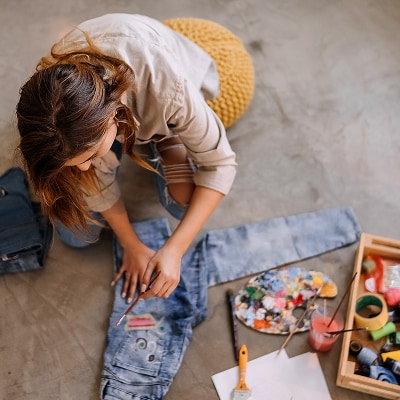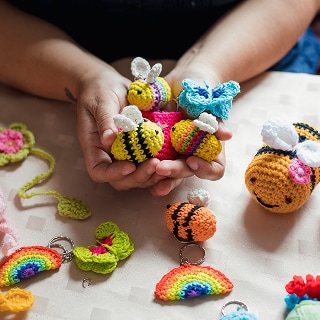
Discover a collection of stories from our authorities on the Longevity Lifestyle, created by ROAR Forward, a collaborative of longevity thought leaders and content creators.
Some people spend so much time scrolling through social media apps that it’s practically their hobby. Of course, viral videos are amusing—but having an actual hobby can be even more fun, especially when it involves doing something with your hands. Think back to the bliss you felt when you made stuff as a child, whether it was braiding a lanyard necklace with your best friend or weaving a potholder for your mom. Bet you didn’t know back then that you were helping boost your brain health.
“Creative hobbies provide a much-needed break from digital overload, and they can bring both joy and a fresh perspective to our lives,” says Laurie Santos, PhD, a psychology professor at Yale University. They’re also beneficial for your well-being. People with hobbies are more likely to have better health, more happiness and higher life satisfaction than those without them, found a study published in Nature Medicine. A positive mental state can have the ultimate payoff: According to research from Emory University, people who have hobbies are 60 percent less likely to die prematurely. Doesn’t pottery sound good right about now?
Take a look at the many benefits of hands-on hobbies. They’ll make you feel better about yours—or inspire you to find one.

Hobbies relax you.
Being fully immersed in an activity helps achieve a serene state known as “flow.” And not that there’s anything wrong with the occasional binge watch, but tactile hobbies require active participation that fully engage your senses and skills. This also helps reduce stress and boost your mood,
says Dr. Santos.
More pleasure, less pressure.
So much of our existence is goal-driven, even during leisure time. You’re not just walking, you’re racking up steps on the tracker. You’re not just relaxing on a beach, you’re looking for a photo opp. Doing a task you love with no worries about efficiency or achievement is uniquely satisfying and fulfilling, says Dr. Santos. You can take your sweet time re-learning your piano scales, and nobody’s going to critique the finished product.
It’s good for your brain.
Hobbies like cross-stitch that demand concentration may help offset the shortened attention spans and scattered thoughts caused by digital multi-tasking, a phenomenon known as “popcorn brain.” It’s what happens when our minds ping-ping-ping between texting, clicking links and updating our calendars. Chronic multi-tasking has been linked to stress, anxiety and depression. “When I’ve taken on a new pursuit like drawing, I felt curiously at peace—it was an ‘immersion bath,’” says Tom Vanderbilt, author of Beginners: The Joy and Transformative Power of Lifelong Learning. “It was also restorative, like my fractured neurons were knitting themselves back together. While I’m not immune to dopamine hits, I’ve come to think: Life is too short for 15-second videos.”
You might get better at work.
Creative pursuits encourage mental flexibility and problem-solving, which could enhance your professional performance, says Dr. Santos. In fact, Nobel Prize-winning scientists are more likely to have artistic or musical hobbies than their less recognized peers, revealed a study in Creative Research Journal.

Your body benefits, too.
Activities like woodworking or making beaded jewelry that involve fine-motor skills can enhance your dexterity. And ones that entail movement, such as gardening, can help keep you limber. Squats and stretches are all part of a hardcore weeding session.
You beat burnout.
Workday. Weekend. Play. Repeat. Hobbies add freshness to your existence, whether you’re creating something or giving a hobby a whirl. “A hobby can not only help remind us that there is more to life than our job or the other ‘big’ things—and that we are more than those things—but it can help breed a kind of resilience,” says Vanderbilt. When you’re trying to process information and work through the little challenges of a new hobby, “work issues and annoyances suddenly seem not that difficult. Hobbies are sort of a space safe for the self.”
The anticipation is amazing.
When you’re having a hectic day, knowing that you can settle into your comfy chair and practice an embroidery stitch in the evening can keep you powering through. “It’s like a little nest egg you store for yourself,” notes Vanderbilt. “The anticipation can be as energizing as the hobby itself.”
Hobbies can boost your social life.
“Doing things solo is great, but connecting with other people over a shared pursuit can amplify the pleasure,” says Vanderbilt.
Check out local programs in your town or explore options on the Hobify or Craftviser apps, and find a hobby friend or mentor on Hobbytwin and Buddee. And you’ll find plenty of inspiration and guidance on YouTube.
Explore more longevity lifestyle stories here.